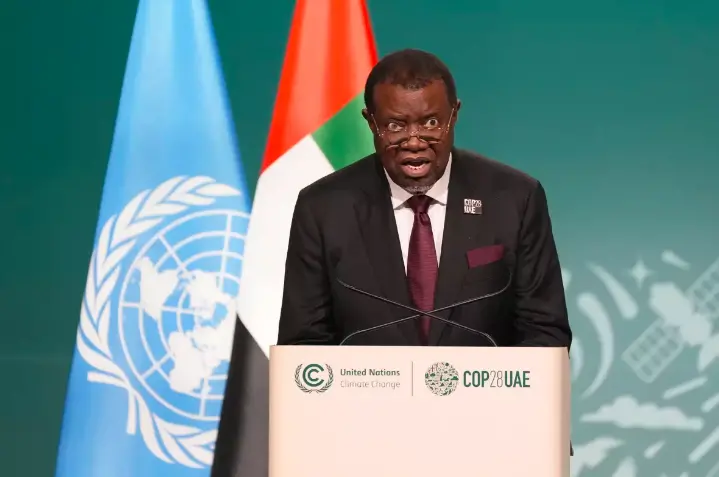Hage Geingob, president of Namibia, one of Africa’s most stable democracies, died Sunday at a local hospital where he was receiving treatment, his office announced.
Geingob’s medical team at Lady Pohamba Hospital did everything they could to help him, but he died surrounded by his wife, Monica Geingos, and his children, the Namibian presidency said in a post on the social networking site X, formerly Twitter.
Angolo Mbumba, the country’s acting president, called for calm and said in the same post that “the government will meet with immediate effect to make the necessary state arrangements in this regard.”
Mbumba called an urgent cabinet meeting, according to local media.
The president was being treated for cancer. Geingob, 82, underwent a colonoscopy and gastroscopy on Jan. 8 followed by a biopsy, his office said this month.
On Jan. 31 he returned home from the United States, where he had received a two-day “novel cancer cell treatment,” according to his office. In 2014 he said he had survived prostate cancer.
Geingob, who had presided over the southern African nation since 2015, was scheduled to finish his second and final term this year. He was the country’s third president since it became independent in 1990, after more than a century under German control and then under South Africa’s apartheid regime.
After spending nearly three decades in exile in neighboring Botswana and the United States as an anti-apartheid activist, Geingob returned to Namibia and was the first to serve as prime minister between 1990 and 2002. He also served in that position between 2008 and 2012.
Gentle-mannered but firm in defending Africa’s interests and involvement in world affairs, Geingob maintained close relations with the United States and other Western countries.
Like many African leaders, he also forged a cordial relationship with China and rejected accusations that Beijing’s economic influence over African countries amounts to a form of colonialism.
Namibia, which lies on the southwest African coast, enjoys political and economic stability in a region marked by strife, violent elections and coups. However, the country’s opposition sharply criticized Geingob last year for backing Zimbabwe’s disputed election result.
Several African leaders expressed their condolences on Sunday.
Zimbabwean President Emmerson Mnanawa wrote on X that Geingob’s “leadership and resilience” would be remembered.
Cyril Ramaphosa, president of neighboring South Africa, one of Namibia’s biggest trading partners, described him as a “close partner in our democratic exercise” and “a great veteran of Namibia’s liberation from colonialism and apartheid.”
Kenyan Prime Minister William Ruto said Geingob was a “distinguished leader who served the people of Namibia with emphasis and dedication” and who “strongly promoted the voice and visibility of the continent on the global stage.”
In a statement, Russian President Vladimir Putin said he will “always treasure” his memories of meeting Geingob. “It is difficult to overestimate his personal contribution to the development of cordial relations between Namibia and Russia.”
Namibia, a country of just 2.5 million people, is rich in resources such as diamonds, gold and uranium. Despite being classified as an upper-middle-income country, socioeconomic inequality remains rampant, according to the World Bank.
The country was scheduled to elect a new leader in November.

